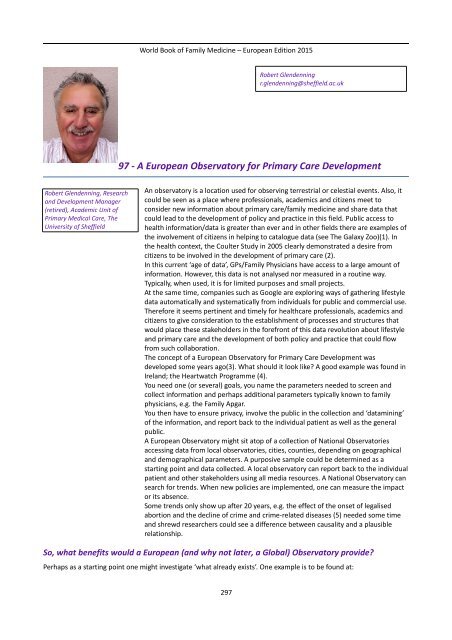Family Medicine
World Book 2015
World Book 2015
Create successful ePaper yourself
Turn your PDF publications into a flip-book with our unique Google optimized e-Paper software.
World Book of <strong>Family</strong> <strong>Medicine</strong> – European Edition 2015<br />
Robert Glendenning<br />
r.glendenning@sheffield.ac.uk<br />
97 - A European Observatory for Primary Care Development<br />
Robert Glendenning, Research<br />
and Development Manager<br />
(retired), Academic Unit of<br />
Primary Medical Care, The<br />
University of Sheffield<br />
An observatory is a location used for observing terrestrial or celestial events. Also, it<br />
could be seen as a place where professionals, academics and citizens meet to<br />
consider new information about primary care/family medicine and share data that<br />
could lead to the development of policy and practice in this field. Public access to<br />
health information/data is greater than ever and in other fields there are examples of<br />
the involvement of citizens in helping to catalogue data (see The Galaxy Zoo)(1). In<br />
the health context, the Coulter Study in 2005 clearly demonstrated a desire from<br />
citizens to be involved in the development of primary care (2).<br />
In this current ‘age of data’, GPs/<strong>Family</strong> Physicians have access to a large amount of<br />
information. However, this data is not analysed nor measured in a routine way.<br />
Typically, when used, it is for limited purposes and small projects.<br />
At the same time, companies such as Google are exploring ways of gathering lifestyle<br />
data automatically and systematically from individuals for public and commercial use.<br />
Therefore it seems pertinent and timely for healthcare professionals, academics and<br />
citizens to give consideration to the establishment of processes and structures that<br />
would place these stakeholders in the forefront of this data revolution about lifestyle<br />
and primary care and the development of both policy and practice that could flow<br />
from such collaboration.<br />
The concept of a European Observatory for Primary Care Development was<br />
developed some years ago(3). What should it look like? A good example was found in<br />
Ireland; the Heartwatch Programme (4).<br />
You need one (or several) goals, you name the parameters needed to screen and<br />
collect information and perhaps additional parameters typically known to family<br />
physicians, e.g. the <strong>Family</strong> Apgar.<br />
You then have to ensure privacy, involve the public in the collection and ‘datamining’<br />
of the information, and report back to the individual patient as well as the general<br />
public.<br />
A European Observatory might sit atop of a collection of National Observatories<br />
accessing data from local observatories, cities, counties, depending on geographical<br />
and demographical parameters. A purposive sample could be determined as a<br />
starting point and data collected. A local observatory can report back to the individual<br />
patient and other stakeholders using all media resources. A National Observatory can<br />
search for trends. When new policies are implemented, one can measure the impact<br />
or its absence.<br />
Some trends only show up after 20 years, e.g. the effect of the onset of legalised<br />
abortion and the decline of crime and crime-related diseases (5) needed some time<br />
and shrewd researchers could see a difference between causality and a plausible<br />
relationship.<br />
So, what benefits would a European (and why not later, a Global) Observatory provide?<br />
Perhaps as a starting point one might investigate ‘what already exists’. One example is to be found at:<br />
297


